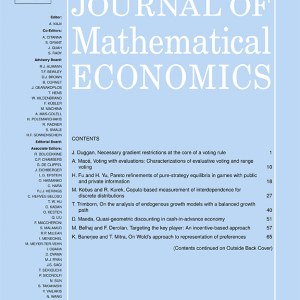
\van den Brink\, J.R. and Pinter, M. (2015). On Axiomatizations of the Shapley Value for Assignment Games Journal of Mathematical Economics, 60(October):110--114.
-
Affiliated author
-
Publication year2015
-
JournalJournal of Mathematical Economics
We consider the problem of axiomatizing the Shapley value on the class of assignment games. It turns out that several axiomatizations of the Shapley value on the class of all TU-games do not characterize this solution on the class of assignment games. However, when considering an assignment game as a (communication) graph game where the game is simply the assignment game and the graph is a corresponding bipartite graph where buyers (sellers) are connected with sellers (buyers) only, we show that Myerson's component efficiency and fairness axioms do characterize the Shapley value on the class of assignment games. Moreover, these two axioms have a natural interpretation for assignment games. Component efficiency yields submarket efficiency stating that the sum of the payoffs of all players in a submarket equals the worth of that submarket, where a submarket is a set of buyers and sellers such that all buyers in this set have zero valuation for the goods offered by the sellers outside the set, and all buyers outside the set have zero valuations for the goods offered by sellers inside the set. Fairness of the graph game solution boils down to valuation fairness stating that only changing the valuation of one particular buyer for the good offered by a particular seller changes the payoffs of this buyer and seller by the same amount.